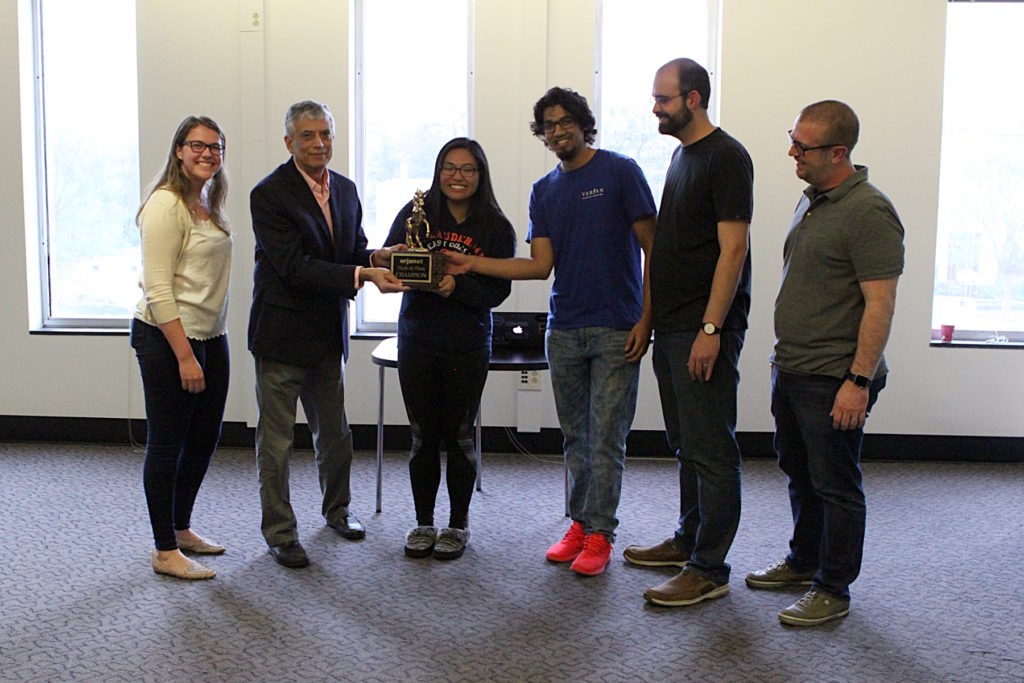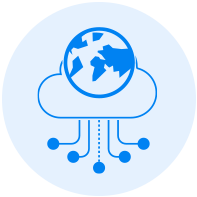
Urjanet Talks Tech at Georgia Tech
Honor Donnie | July 21, 2020 | Urjanet News
Earlier this year, Urjanet stopped by the Georgia Institute of Technology to host virtual office hours through the College of Computing’s career services. With Georgia Tech transitioning to remote learning for the remainder of spring 2020, it provided a unique opportunity for Urjanet to connect with students at home and give them a sense of what it’s like to work with Urjanet’s technology.
What’s it like to work at Urjanet?
Working at Urjanet means working with a company that is rooted in the use of technology for good, supporting global issues like climate action and financial inclusion. Today, Urjanet provides automated access to utility data from over 6,500 providers across the globe. But when the company first started out, it was a small startup incubated at Georgia Tech’s very own ATDC.

Urjanet engineers on a remote conference call
That’s why the Urjanet team was excited to host the very first Tech Talk. The three-hour virtual session gave students an opportunity to log on and connect with Urjanet at their own convenience. In addition to career advice and resume feedback, students also got the chance to hear directly from Urjanet engineers what it’s like to work at Urjanet. Various full-time employees and interns responded to the following questions, posted by Tech students.
What is your favorite thing about working at Urjanet?
“I like that it’s pretty bleeding edge, and so we get to stay on the newest things. It’s also fun and flexible.”
“This is my first job out of school, and I’ve learned a ton. We all get to work on a large variety of things within our software environment, which keeps things fresh and interesting. Plus, everyone on the team is really cool.”
Does Urjanet typically look for upperclassmen when hiring for interns? Or do you hire freshmen as well?
“We tend to hire more upperclassmen, just because they’ve covered more classes, but we’ve hired some really sharp second years too!”
A lot of students like to know what they can do as an underclassmen “to get noticed.” Do you have any recommendations? Especially for those who have not been exposed to computer science as early as some of their peers?
“Any experience with internships is a great way to stand out, as well as extracurricular or research projects.”
Could you all share one piece of career-related advice you wish you heard when you were a student?
“Make sure you know how to test your code and not just how to get it to compile. When I was a student at Tech, most of my focus was on getting the code to do everything an assignment functionally needed to do, and very little time or care was given to testing and deployment.”
“Keep learning new technologies: read more books, play with new languages, and use free training tools.”
“In addition, really consider the kind of company you want to work for. Size, purpose and impact, product, etc.”
What should a third-year student do over the summer to be attractive to employers in the fall, if they don’t have an internship? Professional development recommendations? Recommended trainings? Open source projects? Hackathons?
“One area that I think could be better covered at Tech, at least from when I was a student, is the DevOps/infrastructure/cloud computing side of things. At Urjanet in particular, we use AWS services a lot, so any experience with that is particularly eye-catching. AWS also has a fair amount of online training and summits, and a free tier available for most of their services.”

The winning team of Urjanet’s first hackathon
What do you hope to see on students’ resumes in terms of skills, experience, etc. – and what do you want students to communicate to you throughout the recruitment process?
“If a student has had an internship, I always like to hear about their experience there, especially what kind of team they were a part of, projects they worked on, and technologies used. And I always really like seeing that anyone applying for a development/software engineering role has some sort of experience with automated testing and/or deployment.”
“I like seeing examples where students have taken initiative, whether it’s learning something on their own or with projects and internships. Those students would probably be more successful on our team.”
What are the different areas/teams I could work in/on at Urjanet?
“All of us here are on what we call the CORE team. We develop and maintain the systems that are used to bring utility data into the Urjanet system. We also have a team within the Atlanta engineering group called Deli – short for delivery – that takes the information our team brings into the system and delivers it back to our customers in various forms.”
“On the CORE team, there really aren’t any limitations on which area of the code you work in – you get to work in everything.”
“We call ourselves full-stack engineers, which in summary means you get to work on UI (think angular/typescript) and backend (mainly Java) and databases (relational and non-relational).”
What can you learn from Urjanet’s technology?
Engineers from Urjanet also spent some time at the Tech Talk sharing about how Urjanet’s technology works, and why that presents an exciting learning opportunity for students about to start their careers. As the computing industry evolved over the past six decades, the application development process has also advanced. Today, everything is much more agile – making the lives of software engineers much easier.
Microservices is a new model that takes small, well-factored, single-purpose utility modules and uses them to build larger applications. Urjanet is right in the main wave of the movement to microservices, following these main guiding principles:
- Immutability
- Observability
- Change management
Instead of a long-running service that teams patch up on the fly, microservices adopts the practice of replacing and launching new servers at high speeds. While the concepts aren’t new, the lifecycle has changed to create simplicity, scalability, and independence.
Making changes to a large, monolithic codebase is time-consuming and risky. If you can “decompose the problem, divide and conquer, we can be much more agile and safe,” said engineer director Todd Rose. Microservices allows for more flexibility, which is not only cost-effective but also more responsive and easier to manage.
“Microservices isn’t just an engineering design principle; it’s also an economic business driver.”
“In some ways, it’s not just an engineering design principle; it’s also an economic business driver,” explained Rose. “At a certain scale of software development, microservices became much more agile and manageable.”
Become an Urjanetter
As the world of computing continues to evolve, so will Urjanet’s technology. We’re always on the lookout for new members to join our team and help us stay on the cutting edge. Recently, Urjanet has focused on improving the customer experience, curating new products to each customer. “When we have interns or new hires, this is what they jump into on day one,” said engineering manager Candace Napalo.
Ready to jump in? Check out our open opportunities.
You may also like:
- Employee Spotlight: 2019 Summer Interns
- 7 Reasons You Need More Granular Energy Data
- Urjanet’s Inaugural Hackathon
If you like what you’re reading, why not subscribe?
About Honor Donnie
Honor Donnie is a Marketing Coordinator at Urjanet, with a passion for content creation. When she’s not at Urjanet, she can be found reading, cooking, and listening to great music.
You May Also Like
Employee Spotlight: 2019 Summer Interns
Amy Hou | August 8, 2019 | Urjanet News
